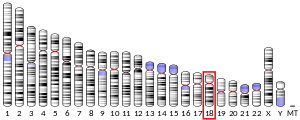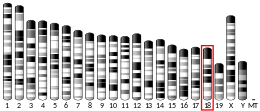Small nuclear ribonucleoprotein D1
Appearance
Small nuclear ribonucleoprotein Sm D1 is a protein that in humans is encoded by the SNRPD1 gene.[5][6]
Function
This gene encodes a small nuclear ribonucleoprotein that belongs to the SNRNP core protein family. The protein may act as a charged protein scaffold to promote SNRNP assembly or strengthen SNRNP-SNRNP interactions through nonspecific electrostatic contacts with RNA.[7]
Interactions
Small nuclear ribonucleoprotein D1 has been shown to interact with:
References
- ^ a b c GRCh38: Ensembl release 89: ENSG00000167088 – Ensembl, May 2017
- ^ a b c GRCm38: Ensembl release 89: ENSMUSG00000002477 – Ensembl, May 2017
- ^ "Human PubMed Reference:". National Center for Biotechnology Information, U.S. National Library of Medicine.
- ^ "Mouse PubMed Reference:". National Center for Biotechnology Information, U.S. National Library of Medicine.
- ^ Lehmeier T, Raker V, Hermann H, Lührmann R (Dec 1994). "cDNA cloning of the Sm proteins D2 and D3 from human small nuclear ribonucleoproteins: evidence for a direct D1-D2 interaction". Proceedings of the National Academy of Sciences of the United States of America. 91 (25): 12317–21. doi:10.1073/pnas.91.25.12317. PMC 45428. PMID 7527560.
- ^ Lehmeier T, Foulaki K, Lührmann R (Nov 1990). "Evidence for three distinct D proteins, which react differentially with anti-Sm autoantibodies, in the cores of the major snRNPs U1, U2, U4/U6 and U5". Nucleic Acids Research. 18 (22): 6475–84. doi:10.1093/nar/18.22.6475. PMC 332598. PMID 1701240.
- ^ "Entrez Gene: SNRPD1 small nuclear ribonucleoprotein D1 polypeptide 16kDa".
- ^ Ajuh P, Kuster B, Panov K, Zomerdijk JC, Mann M, Lamond AI (Dec 2000). "Functional analysis of the human CDC5L complex and identification of its components by mass spectrometry". The EMBO Journal. 19 (23): 6569–81. doi:10.1093/emboj/19.23.6569. PMC 305846. PMID 11101529.
- ^ Friesen WJ, Paushkin S, Wyce A, Massenet S, Pesiridis GS, Van Duyne G, Rappsilber J, Mann M, Dreyfuss G (Dec 2001). "The methylosome, a 20S complex containing JBP1 and pICln, produces dimethylarginine-modified Sm proteins". Molecular and Cellular Biology. 21 (24): 8289–300. doi:10.1128/MCB.21.24.8289-8300.2001. PMC 99994. PMID 11713266.
- ^ Charroux B, Pellizzoni L, Perkinson RA, Shevchenko A, Mann M, Dreyfuss G (Dec 1999). "Gemin3: A novel DEAD box protein that interacts with SMN, the spinal muscular atrophy gene product, and is a component of gems". The Journal of Cell Biology. 147 (6): 1181–94. doi:10.1083/jcb.147.6.1181. PMC 2168095. PMID 10601333.
- ^ Meister G, Bühler D, Laggerbauer B, Zobawa M, Lottspeich F, Fischer U (Aug 2000). "Characterization of a nuclear 20S complex containing the survival of motor neurons (SMN) protein and a specific subset of spliceosomal Sm proteins". Human Molecular Genetics. 9 (13): 1977–86. doi:10.1093/hmg/9.13.1977. PMID 10942426.
- ^ Liu Q, Fischer U, Wang F, Dreyfuss G (Sep 1997). "The spinal muscular atrophy disease gene product, SMN, and its associated protein SIP1 are in a complex with spliceosomal snRNP proteins". Cell. 90 (6): 1013–21. doi:10.1016/s0092-8674(00)80367-0. PMID 9323129. S2CID 10855404.
- ^ Friesen WJ, Dreyfuss G (Aug 2000). "Specific sequences of the Sm and Sm-like (Lsm) proteins mediate their interaction with the spinal muscular atrophy disease gene product (SMN)". The Journal of Biological Chemistry. 275 (34): 26370–5. doi:10.1074/jbc.M003299200. PMID 10851237.
- ^ Fury MG, Zhang W, Christodoulopoulos I, Zieve GW (Nov 1997). "Multiple protein: protein interactions between the snRNP common core proteins". Experimental Cell Research. 237 (1): 63–9. doi:10.1006/excr.1997.3750. PMID 9417867.
- ^ Kambach C, Walke S, Young R, Avis JM, de la Fortelle E, Raker VA, Lührmann R, Li J, Nagai K (Feb 1999). "Crystal structures of two Sm protein complexes and their implications for the assembly of the spliceosomal snRNPs". Cell. 96 (3): 375–87. doi:10.1016/s0092-8674(00)80550-4. PMID 10025403. S2CID 17379935.
Further reading
- Renz M, Heim C, Bräunling O, Czichos A, Wieland C, Seelig HP (Sep 1989). "Expression of the major human ribonucleoprotein (RNP) autoantigens in Escherichia coli and their use in an EIA for screening sera from patients with autoimmune diseases". Clinical Chemistry. 35 (9): 1861–3. doi:10.1093/clinchem/35.9.1861. PMID 2528429.
- Rokeach LA, Haselby JA, Hoch SO (Jul 1988). "Molecular cloning of a cDNA encoding the human Sm-D autoantigen". Proceedings of the National Academy of Sciences of the United States of America. 85 (13): 4832–6. doi:10.1073/pnas.85.13.4832. PMC 280530. PMID 3260384.
- Sun D, Ou YC, Hoch SO (Apr 1997). "Analysis of genes for human snRNP Sm-D1 protein and identification of the promoter sequence which shows segmental homology to the promoters of Sm-E and U1 snRNA genes". Gene. 189 (2): 245–54. doi:10.1016/S0378-1119(96)00858-X. PMID 9168134.
- Liu Q, Fischer U, Wang F, Dreyfuss G (Sep 1997). "The spinal muscular atrophy disease gene product, SMN, and its associated protein SIP1 are in a complex with spliceosomal snRNP proteins". Cell. 90 (6): 1013–21. doi:10.1016/S0092-8674(00)80367-0. PMID 9323129. S2CID 10855404.
- Fury MG, Zhang W, Christodoulopoulos I, Zieve GW (Nov 1997). "Multiple protein: protein interactions between the snRNP common core proteins". Experimental Cell Research. 237 (1): 63–9. doi:10.1006/excr.1997.3750. PMID 9417867.
- Kambach C, Walke S, Young R, Avis JM, de la Fortelle E, Raker VA, Lührmann R, Li J, Nagai K (Feb 1999). "Crystal structures of two Sm protein complexes and their implications for the assembly of the spliceosomal snRNPs". Cell. 96 (3): 375–87. doi:10.1016/S0092-8674(00)80550-4. PMID 10025403. S2CID 17379935.
- Charroux B, Pellizzoni L, Perkinson RA, Shevchenko A, Mann M, Dreyfuss G (Dec 1999). "Gemin3: A novel DEAD box protein that interacts with SMN, the spinal muscular atrophy gene product, and is a component of gems". The Journal of Cell Biology. 147 (6): 1181–94. doi:10.1083/jcb.147.6.1181. PMC 2168095. PMID 10601333.
- Charroux B, Pellizzoni L, Perkinson RA, Yong J, Shevchenko A, Mann M, Dreyfuss G (Mar 2000). "Gemin4. A novel component of the SMN complex that is found in both gems and nucleoli". The Journal of Cell Biology. 148 (6): 1177–86. doi:10.1083/jcb.148.6.1177. PMC 2174312. PMID 10725331.
- Mammoto A, Sasaki T, Kim Y, Takai Y (May 2000). "Physical and functional interaction of rabphilin-11 with mammalian Sec13 protein. Implication in vesicle trafficking". The Journal of Biological Chemistry. 275 (18): 13167–70. doi:10.1074/jbc.C000096200. PMID 10747849.
- Brahms H, Raymackers J, Union A, de Keyser F, Meheus L, Lührmann R (Jun 2000). "The C-terminal RG dipeptide repeats of the spliceosomal Sm proteins D1 and D3 contain symmetrical dimethylarginines, which form a major B-cell epitope for anti-Sm autoantibodies". The Journal of Biological Chemistry. 275 (22): 17122–9. doi:10.1074/jbc.M000300200. PMID 10747894.
- Meister G, Bühler D, Laggerbauer B, Zobawa M, Lottspeich F, Fischer U (Aug 2000). "Characterization of a nuclear 20S complex containing the survival of motor neurons (SMN) protein and a specific subset of spliceosomal Sm proteins". Human Molecular Genetics. 9 (13): 1977–86. doi:10.1093/hmg/9.13.1977. PMID 10942426.
- Ajuh P, Kuster B, Panov K, Zomerdijk JC, Mann M, Lamond AI (Dec 2000). "Functional analysis of the human CDC5L complex and identification of its components by mass spectrometry". The EMBO Journal. 19 (23): 6569–81. doi:10.1093/emboj/19.23.6569. PMC 305846. PMID 11101529.
- Selenko P, Sprangers R, Stier G, Bühler D, Fischer U, Sattler M (Jan 2001). "SMN tudor domain structure and its interaction with the Sm proteins". Nature Structural Biology. 8 (1): 27–31. doi:10.1038/83014. PMID 11135666. S2CID 27071310.
- Urlaub H, Raker VA, Kostka S, Lührmann R (Jan 2001). "Sm protein-Sm site RNA interactions within the inner ring of the spliceosomal snRNP core structure". The EMBO Journal. 20 (1–2): 187–96. doi:10.1093/emboj/20.1.187. PMC 140196. PMID 11226169.
- Friesen WJ, Massenet S, Paushkin S, Wyce A, Dreyfuss G (May 2001). "SMN, the product of the spinal muscular atrophy gene, binds preferentially to dimethylarginine-containing protein targets". Molecular Cell. 7 (5): 1111–7. doi:10.1016/S1097-2765(01)00244-1. PMID 11389857.
- Park JW, Voss PG, Grabski S, Wang JL, Patterson RJ (Sep 2001). "Association of galectin-1 and galectin-3 with Gemin4 in complexes containing the SMN protein". Nucleic Acids Research. 29 (17): 3595–602. doi:10.1093/nar/29.17.3595. PMC 55878. PMID 11522829.
- Friesen WJ, Paushkin S, Wyce A, Massenet S, Pesiridis GS, Van Duyne G, Rappsilber J, Mann M, Dreyfuss G (Dec 2001). "The methylosome, a 20S complex containing JBP1 and pICln, produces dimethylarginine-modified Sm proteins". Molecular and Cellular Biology. 21 (24): 8289–300. doi:10.1128/MCB.21.24.8289-8300.2001. PMC 99994. PMID 11713266.
- Gubitz AK, Mourelatos Z, Abel L, Rappsilber J, Mann M, Dreyfuss G (Feb 2002). "Gemin5, a novel WD repeat protein component of the SMN complex that binds Sm proteins". The Journal of Biological Chemistry. 277 (7): 5631–6. doi:10.1074/jbc.M109448200. PMID 11714716.








